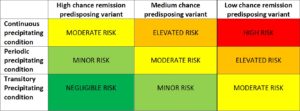In the current aHUS related trials list reported on recently, there were two which were looking at the safe withdrawal of eculizumab.
In addition to these two trials, it is known that similar studies are taking place in The Netherlands , Italy and UK (click here to find out more) There may be other studies taking place which are yet to gain a public profile.
Not unnaturally, given the devastating effect on patients when they encounter the disease ,there is considerable apprehension about withdrawal from a treatment that stopped the disease in its tracks. The apprehension is raised in those who have had kidney transplants in the past , which precipitated another aHUS episode often within days of receiving a new kidney.
The fact remains that even before the advent of eculizumab some aHUS patients went into remission with or without ending up on dialysis. For some the remission has been long lasting ,for others not so. What was it about these people that resulted in different outcomes, and ,effectively, demonstrated that some were at more risk than others of having further on sets, albeit at differing intervals.
The two groups had experienced aHUS and the two groups were the same people before and after the onset. But there had been different conditions for all that led up to the episode, and after genetic testing it was known that all had different genetic predispositions.
Triggering events ,together with a mix of significant genetic variants in immune system ,are needed to bring on aHUS. There are many known precipitating triggers and patients may experience many hits from them before the one that is catastrophic. Also the small variations in their genes have a significant difference on outcomes.
So it will be going forward for all aHUS patients. So it is also no surprise that patients face different risks following the withdrawal of treatment . Each aHUS patient will have a risk profile and each will fall into a spectrum of risk from withdrawal ,from negligible ( no one can say zero risk) to high ,with other levels in between based on precipitating conditions and genetic variants, as illustrated in the risk matrix below.
RISK MATRIX FOR WITHDRAWAL OF ECULIZUMAB

The outcome of the various studies taking place should provide information about what precipitating events and variants make up each of the categories, so that patients with similar profiles can be advised and decisions made dependent on the risks- the decision tree as the French STOPECU study is searching for. The other independent studies plus all the one off case studies can add more evidence to the make the decision tree even more accurate and reliable.
Eculizumab is the magic bullet for aHUS when needed and for as long as it is needed. Some will need it for long time, some will need it from time to time and others may no longer need it based on sound clinical evidence, not arbitrary financial caps.

